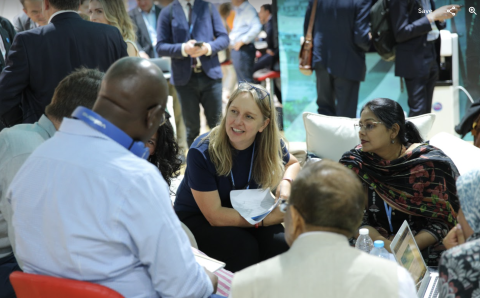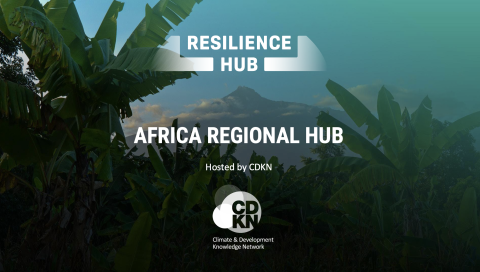CDKN at COP28
CDKN at COP28
CDKN will have a busy COP28 programme in Dubai and we look forward to meeting you at the multiple sessions we are co-convening with our partners. Find out more below.
COP28 negotiators in Dubai must address key tasks such as evaluating global progress on the Paris Agreement through the first Global Stocktake (GST), adopting and operationalising the loss and damage fund (established at COP27) and agreeing on a framework for the Paris Agreement’s Global Goal on Adaptation (GGA).
CDKN has a packed COP28 agenda. We are excited to launch a new publication and video with the Global Center on Adaptation (GCA) sharing ‘Stories of Resilience’ from local adaptation leaders all over the world. You will also find us at the Resilience Hub convening discussions on accelerating access to finance locally, meaningfully amplifying local voices in global spaces, and democratising science and amplifying alternative voices in, with, and through, art. Additionally, we will host an official UNFCCC side event to share learnings from Gender Equality in a Low Carbon World (GLOW) and CDKN on strategies to avoid maladaptation by putting social inclusion at the centre of climate action. At the PCCB Hub, we will co-host two events on implementing locally-led adaptation (LLA) metrics and exploring human rights-based approaches to addressing climate change and biodiversity loss.

CDKN events
Accelerating Indigenous Peoples and Local Communities (IPLCs) access to inclusive and appropriate finance to empower action at the local level
Date: Friday 1 December
Location: Resilience Hub
Time: 13.30-14.30 (GMT +4)
Hosts: Building Approaches to fund local Solutions with climate Evidence (BASE), CDKN and Voices for Just Climate Action (VCA)
Register for the hub to join virtually
Event interpretation: Spanish and French
Accelerating access to appropriate and inclusive climate finance is pivotal to empower transformative climate action at the local level. IPLCs play a crucial role in implementing mitigation and adaptation measures. However, constraints to access funds and appropriate sources of climate finance remain critical bottlenecks for unlocking resources for local solutions. This event will unpack approaches to contextualise financial and climate language and information to facilitate predictable, flexible and easily accessible finance for LLA. The event will also explore the importance of democratising access to climate finance and practical actions for addressing the challenges faced by IPLCs.
What meaningful and authentic amplification of local voices into global spaces means in practice
Date: Friday 1 December
Location: Resilience Hub
Time: 16:30-17:30 (GMT +4)
Hosts: SSN/CDKN, International Centre for Climate Change and Development (ICCCAD) and Fundación Avina
Register for the hub to join virtually
Event interpretation: Spanish, French and Portuguese
The session will facilitate a critical discussion on practical approaches to meaningfully and authentically amplify local voices, drawing on three years of experience with the regional resilience hubs at COP26, COP27 and COP28. Participants, including local voices, intermediaries, donors and support partners, will explore how to support local engagement in global discussions, emphasising the Regional Hubs' role in amplifying lesser heard voices and providing a platform for key learnings and direct input from local level voices. In addition, the GCA-CDKN 'Stories of Resilience: Lessons from Local Adaptation Practice' report and accompanying video will be launched.
Empowering the vulnerable: Evaluating locally-led adaptation (LLA) for climate finance accountability in the least developed countries and the global South.
Date: Sunday 3 December
Location: LDC Pavillion
Time: 10:00-11:00 (GMT +4)
Hosts: FFLA/CDKN, Fundación Avina, ICCCAD and International Institute for Environment and Development (IIED)
This learning event will bring together experts, policymakers, practitioners and stakeholders from around the world to assess the impact of LLA efforts in the context of climate finance accountability. Valuable insights, learnings and knowledge sharing from evaluating the LLA principles, now endorsed by over 100+ stakeholders, will be shared.
Neglected opportunities to implement Nationally Determined Contributions (NDCs) in food systems: Incorporating soil health, livestock, youth employment and women’s empowerment in African countries
Date: Sunday 3 December
Location: NDCP Pavilion
Time: 11:00-12:00 (GMT +4)
Hosts: SNV, Coalition of Action 4 Soil Health (CA4SH) and World Wide Fund for Nature (WWF)
Youth and gender are frequently cited in three quarters of Nationally Determined Contributions (NDCs), yet often lack substantial implementation or financial support. This event urges member states to pick up these and other neglected opportunities, including those related to food system transformation, and explore entry points for local actors to ensure their role in the practical operationalisation of NDCs.
Alliances for women’s empowerment
Date: Monday 4 December
Location: Namibia Pavilion
Time: 12:00-13:00 (GMT +4)
Hosts: GLOW and CDKN
Despite facing structural disadvantages, women and girls across the world demonstrate climate leadership through their own initiative and determination, not due to good public policy and programme design. This event explores cases of such leadership, aiming to make the empowerment of women and girls the norm in climate-resilient development, emphasising the need for strategic alliances to support their rights and effective climate action.
Strategies to avoid maladaptation by putting social inclusion at the centre of climate action
Date: Friday 8 December
Location: Side Event Room 2
Time: 13:15-14:45 (GMT +4)
Hosts: CDKN, GLOW and Government of Namibia
Youtube broadcast link available here
This event will highlight evidence that climate actions must be designed to support the needs of the poorest and empower marginalised voices to avoid maladaptation. It will showcase findings from government-, business- and community-led initiatives from Africa, Asia and Latin America focusing on inclusive programming to address poverty and promote equality, including gender equality, in the transition to climate-resilient, low- carbon economies.
South-South learning from experiences on operationalising locally-led adaptation (LLA) metrics
Date: Friday 8 December
Location: PCCB Hub
Time: 15:40-16:40 (GMT +4)
Hosts: Global Resilience Partnership (GRP), Africa Research and Impact Network (ARIN) and CDKN
It is crucial to measure LLA initiatives in alignment with the Global Stocktake (GST) and the Paris Agreement’s Global Goal on Adaptation (GGA), emphasising the co-creation of approaches with communities as partners. This session will leverage insights from previous events including the EbA Knowledge Day and the Africa Climate Summit to underscore the necessity for platforms facilitating discussions and collaboration on strengthening evidence bases for LLA metrics in the global South.
Biodiversity and climate action: What is a human rights based approach in practice?
Date: Saturday 9 December
Location: PCCB Hub
Time: 16:15-17:15 (GMT +4)
Hosts: SwedBio, Soka Gakkai International (SGI), ICLEI – Local Governments for Sustainability, Women4Biodiversity (W4B), CDKN, Quaker United Nations Office (QUNO), International Law Commission (ILC), Secretariat of the Convention on Biological Diversity (SCBD), Children and Youth Constituency of the UNFCCC (YOUNGO) and SwedWatch
The session aims to foster an enhanced understanding of a human rights-based approach in addressing climate change and biodiversity loss, emphasising practical applications from local to global levels. Through highlighting successful examples and strengthening collaboration across stakeholder groups, the event aims to facilitate inclusive climate and biodiversity actions.
Artivism for resilient futures: Democratising science and amplifying alternative voices in, with, and through art
Date: Monday 11 December
Location: Resilience Hub
Time: 10:30-11:30 (GMT +4)
Hosts: Hivos and CDKN
Register for the hub to join virtually
Indigenous, traditional and local knowledge, culture and heritage are frequently overlooked in climate research, action and policy, with marginalised groups often excluded from decision-making processes. Knowledges that are often expressed through art, cultural experiences and values have not been generally understood. However, art has the power to bridge societal gaps. Through this session, we will convene artists and storytellers to share and perform their stories and engage in a shared language to amplify diverse voices and communicate climate impacts from various perspectives, fostering engagement in climate justice for a resilient future.
COP28 Africa Regional Resilience Hub
The 2023 Africa Regional Resilience Hub is co-led by SSN and SDI. The Hub is delivering a programme of in-person and virtual engagements to bring local voices to the global stage from May to November 2023. The Regional Hubs ensure that the best practices and perspectives of those most affected by the climate crisis are amplified and increasingly drive the agenda of the annual COPs. This year, nine key themes will shape the Resilience Hub’s narrative and programming. Each theme is led by a small group of organisations and experts across sectors and fields. The Resilience Hub at COP28 ‘agenda-at-a-glance’ is available here.
Session recordings from this year will be posted to the YouTube channel, where you can also find videos from last year’s Africa Regional Hub.

A call to action for gender-just, low-carbon economies
Hundreds of speakers and attendees gathered at a side event of the Women Deliver 2023 conference to consider how governments, businesses, organisations and individuals can move ‘beyond warm words’ and achieve the interconnected goals of gender equality and climate security in practice – that is, lives and livelihoods that are low in emissions and resilient to climate change. This is the statement and call to action of the session, signed by contributors in their personal capacities. Become a signatory and join the call here.
